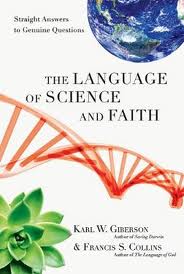The Language of Science and Faith
Can Christians affirm the general theory of evolution and believe God is Creator? A new book from Karl Giberson and Francis Collins answers this question with a resounding YES!
The Language of Science and Faith offers straight answers to genuine questions about contemporary science and Christian theology.
This is the kind of book you should give those wrestling seriously with evolution and Christian faith. It’s not a book written in technical language only academicians could understand. The prose is accessible and the language lucid.
Basic Answers to Common Questions
Suppose you’re having a conversation about some issue related to God and contemporary science. In the conversation, your friend asks, “So what do you mean by evolution?” Or your friend wonders, “What actually is the evidence for evolution?”
You could refer this friend to a biology textbook. But few textbooks offer concise answers with the questions of faith in mind. What you need is a book that gives understandable, brief, and informed answers to pertinent questions.
Enter The Language of Science and Faith, by Giberson and Collins. The questions above are only the tip of the iceberg. Discussions of science and faith move in a myriad of directions and raise dozens of questions. Giberson and Collins’s book answers many of the most common:
Is there proof of macroevolution?
Can we really know the earth is billions of years old?
Does the Bible teach the world is young?
Can religion contribute to science or science contribute to religion?
How should we read Genesis?
What should we do when science and Christian faith seem to conflict?
What role might God play in evolution?
Does evolution worsen the problem of evil?
Does evolution disprove God?
Why are Darwin’s theories controversial?
Do thermodynamics disprove evolution?
Does the mystery of the origin of life undermine evolution?
How are the Big Bang, fine-tuning, and God as Creator related?
What is Intelligent Design?
Did humans come from monkeys?
Is human evolution an accident?
What about Adam and Eve?
Uniting the Pair So Long Disjoined: Science and Faith
The final chapter of the book offers a contemporary story of creation – a grand narrative. This narrative uses the language and ideas of both contemporary science and Christian faith. It’s a brief summary for the issues addressed in the book.
Throughout the book, Giberson and Collins make a convincing case that a Christian can affirm both the general theories of contemporary science – including evolution – and the general doctrines of Christian faith. Along the way, they address problems they see in Young Earth creationism, Intelligent Design, and atheism.

Specialists in the science-and-religion discussion will not find detailed or nuanced arguments in this book. The authors didn’t write The Language of Science and Faith for an academic conference.
The dearth of sophisticated arguments doesn’t mean the book is erroneous. But it does mean those wanting to go deeper to answer questions such as those I’ve listed above should consult a more extensive science-and-religion bibliography.
This book plays a very important role. It is perfect for cross-disciplinary conversations, university seminars on science and faith, and Sunday school discussions. It promotes a particular perspective – often called “theistic evolution” but herein labeled “biologos” – that I personally find most plausible overall.
Although the book may not convince those strongly predisposed to atheism or young earth creationism, it can help people open to serious discussion about contemporary science and Christian faith. This book should convince those sitting on or near the fence on questions of evolution and Christian belief.
I heartily recommend The Language of Science and Faith!

Comments
I appreciate all the work Giberson has done to promote a dialogue between faith and science, and to dismantle Creationism.
I do, however, take issue with (and am unimpressed by) arguments like Giberson’s formulation of the Anthropic Principle, which point to unfalsifiable realms of science as bridges between science and faith, or as the fingerprint of god. In my view, these kinds of arguments are a misuse of science because they exploit the technical limitations of science as we know it; no more reasonable than pointing to corrupt clergy (or other inherent limitation of a human institution) as grounds for rejecting belief in god.
In the end, Giberson’s vision of the Anthropic Principle seems like just one more (albeit clever) god-of-the-gaps arguments; reminiscent of Ken Miller’s similarly clever ‘god working at the level of quantum indeterminacy’ idea.
Anyone else unsatisfied with the anthropic principle and similar argument(s)?
It is my understanding that both the weak and strong Anthropic Principles are philosophical assertions and/or, pardon the pun, world-views. I don’t read Giberson’s formulation as being definitive, instead I find it illustrative of just one of many philosophical aspects that are helpful in constructing communication, and eventually peace, between evangelical Christianity and Science. Similarly, even though I am equally disinterested in “God-of-the-gaps” arguments, arguments that want to point to possible instances of divinity all share the commonality that their heart is in the right place: they are searching for God at work in our world.
Ultimately, I think it is well within God’s capacity, and motive, to work in such a way that while we will always have testimony, we may never have unambiguous certifiable evidence to God’s action in the world. It is after all faith already established that seeks understanding in such matters of religious truth, where it is evidence already discovered and observable data that seeks understanding in matters of scientific truth. It is our effort, as philosophers and theologians and scientists, to dare to tread where few might follow in establishing a collective dialog where truth may speak with truth, religious and scientific respectively, without erroneous and painful contradiction or hierarchy.
Ultimately I am willing to bet this book will be a good step for a lot of Sunday School attendees to begin that journey of scientific truth alongside religious or spiritual truth.
On the “How should we read Genesis?” topic, I found Walton’s Lost World of Genesis One to be helpful, not least in the sense of clearing the way for many of the questions in the above list to be answered unfettered by Creationism.
As someone who does not readily accept theistic evolution, I’m not sure this book will change my mind, however I do appreciate that it keeps the conversation open. I think it can be dangerous to keep a very close-minded view to the point where one won’t even listen to other ideas. Both science and religion are constantly changing fields, and it is important to remain open to analyzing new information from both sides. I look forward to reading the viewpoints presented by these authors.
I look forward to reading more from Karl Giberson and delving into the “debate” between science and faith in a more direct way. I appreciate the fact that both authors worked to address other viewpoints such as intelligent design, creationism and atheism. I’m interested in reading more about the questions listed above so that I can formulate my own opinion on how to answer them. I think books like The Language of Science and Faith are important tools that can help Christians stay open-minded to all views and continue to discuss differing opinions respectfully.
Finally, I book that will help with the discussion of science and religion. I wondered what the actual evidence is for evolution. I think this is a great idea to get common people to start the discussion of science and religion. I am looking forward to reading how we should read Genesis one in light of the evolution evidence.
I look forward to reading this book I think it can be a will be a very useful tool when trying to sort through and understand all of the different positions and ideas that this controversy presents. Even though this book may give light to some who are struggling with certain questions about science and faith I hope that this book is not the end of their quest for the answers they are looking for.
As the rest of the class to seems, I too am really excited to read this book. I am excited to read some of the questions and topics they raise about the relationship between science and faith. Furthermore I am particularly interested in their reasoning and backing for the cooperation of science and faith because so far it seems this theistic evolution as read in polkinghornes book, is a plausible and legitimate balance between the two. Hopefully too, there will be a few topics I will be able to raise with friends, students, and mentors.
This book sounds very interesting. There are a lot of Christians who automatically discount evolution and it will be good, for these people especially, to think about issues that they weren’t taught in the Church. There are so many people who will stay stuck in their beliefs without considering any other theories and I feel they are cheating themselves out of being a better well-rounded person. I hope this book is read by many and that it will be successful.
I wish that we could have read this before our debate!!!! I think that it would have given us so many answers, or at least theories to use today! But I am very excited to read a book by Giberson that again answers a lot of the tough questions that I am struggling with in my journey with theistic evolution. It makes me so happy to finally be allowed to be both a Christian and a logical scientist! What I think I’ll be most excited and interested to read about is God and the Big Bang, the contributions of science and religion, Adam and Eve, and humans coming from monkeys!
It sounds very interesting. I am looking forward to read how they believe we should read Genesis. I do want understand more on their basis for this relationship between faith and science. I agree that a book like this may not change people’s view on this issue. But that we can agree to disagree I think is very important and what makes this country great. After all we can all agree on the most important part of this argument that God is God. And in my opinion that is really all that matters. Though I do enjoy learning more about the beliefs and opinions that may differ from mine. I think such education is very important and helps you learn even if you do not change your opinion on evolution or any other thing for that matter.
I look forward to reading this book to see what the authors have to say. Having read another of Giberson’s books, I am curious how the two pieces will relate. The comment toward the end of the review, “Specialists in the science-and-religion discussion will not find detailed or nuanced arguments in this book,” has me a bit discouraged. I feel like I have read reviews and been a part of this discussion for years, but have never heard an academic argument from theistic evolutionists. I feel there are some serious concerns brought up by Giberson and the like’s opposition and I have yet to hear a decent rebuttal. Hopefully this book goes more in depth than this review suggests.
The book The Language of Science and Faith is a very interesting book. I have been reading through it for the last week and have come up with some interesting concept. The book is full of questions about things that a normal person doesnt really think about everyday. I know evolution is a big topic these days and I am learning about new ideas for a Christian perspective. I think it is a great book so far and I am excited to finish the whole thing.